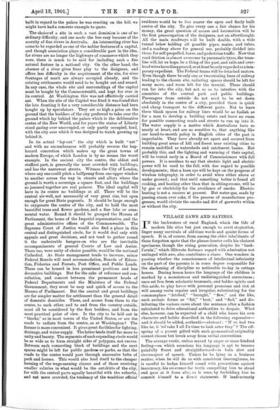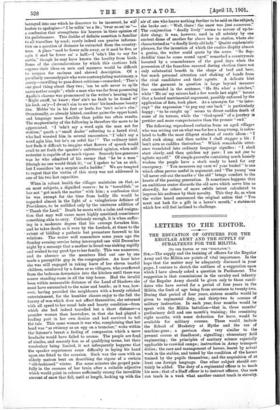VILLAGE SAWS AND SAYINGS.
IN the backwaters of rural England, which the tide of modern life stirs but just enough to avert stagnation, linger many survivals of old-time words and quaint forms of speech. It is, of course, from among the older inhabitants -ef these forgotten spots that the phrase-hunter culls his choicest specimens, though the rising generation, despite its " book- rarnin'," which illiterate forbears regard with admiration not untinged with awe, also contributes a share. One wonders in passing whether the consciousness of intellectual inferiority on the part of the parents is in some degree responsible for the slackening of discipline so noticeable to-day in cottage homes. During lesson hours the language of the children is marked by a monotonous and undistinguished correctness ; once set free from scholastic trammels, and bolder spirits cast this aside, to play havoc with personal pronouns and riot at will among verbs regular and irregular, substituting for the commonplace "fetched," "brought," 'flew," and the like, such archaic forms as " fot," " brot," and "foci," and dis- tributing the various cases about' the sentence after a fashion calculated to drive educational authorities to despair. What else, however, can be expected of a child who hears his own character and habits described in the following expressive— and it should be added, authentic—abstract : "If us had two like he, it 'ud take I all l's time to look atter they" ? The off- spring of a parent gifted with such grammatical originality cannot choose but break away from verbal conventions: The average rustic, unless moved by anger or some kindred feeling—on which occasions his language is apt to become Painfully fluent and straightforward—is both slow and circumspect of speech. Unless he be lying as a business matter, when he will do so with consistent thoroughness, he is careful to hedge himself round with precautions against inaccuracy, his reverence.for truth compelling to stand and gaze at it from afar, as it were, by forbidding him to commit- himself to a direct statement. If inadvertently betrayed into one which he discovers to be incorrect, he will beaten to apologise—" I be tellin"ee a lie ; 'twur so-an'-so "- a confession that strengthens his -bearers in their opinion of his guilelessness. This dislike of definite assertion is familiar to.all travellers by road; rarely indeed can precise informa- tion on a question of distance be extracted from the country- man. A place " med be fower mile away, or it med be five, or agin it riled be fower an' a half,—I 'udn't like to say fur sartin," though he may have known the locality from birth. Some of the circumlocutions by which this cautious folk express their ideas on men and manners would be difficult to Surpass for raciness and shrewd description. Of a peculiarly uncomelypair who were contemplating matrimony, a gossip—unwilling to pass direct criticism—remarked; 'Thers one good thing about they ttvo ; 'um be safe never to sp'ile narra nother couple"; while a man who was far from possessing Apollo's charms was pronounced in the writer's hearing to be "Right anuff, 'ee k-naw ; ther' ain't no fault to be found wi' his look, on'y—I dwun't slim to see wher' his handsome beauty lies. MebbeAis in his feet or heels, fur 'ten't no'er's else." Occasionally, as already hinted, candour gains the upper hand, and language more forcible than polite too often results. The magnanimity of the following is therefore the more to be aPpreciated. "I 'udn't say a word agin the man not fur wotiver," quoth a "-small dealer" referring to a bated rival, who had worsted him in several encounters, "1 'udn't say a word agin him, but he's an orful liar ! " The ordinary intel- lect- finds it difficult to imagine what flowers of speech would availlo set forth the speaker's* unfettered opinion, when self- restraint is 'capable of so much vigour. Scarcely less generous was . he• who admitted Of his enemy that "he be a man" (though no one would think it), " an'.I, spakes to 'un as sich ; but I coneiders 'un a sarpint and a hadder." We are tempted to-regret that the victim of this story was not addressed in
one of his two list capacities. . ,
.When in robust, health the villager maintains on that, as on most subjeets, a dignified reserve: he* is "torrablish," or ha:s.not "got much the matter" with him"; a confession that he was exempt for, the time from bodily, ills would be regarded almost in the light of a vainglorious defiance of Providence, to be nullified only by the unctuous addition of "Thank the Lard." Death he meets with a 'calm and resigna- tion. that may. well 'cause more. highly s.ensitised consciences something.akin to envy.' CarioUsly enough, it is when suffer- ing in a Moderate degree that his courage forsakes him, and he takes death as it were by the forelock, at times to the extent:-of. bidding' a pathetic but premature. farewell to his relations. The writer well, remembers some years ago the Sunday evening service being interrupted one wild December night hy a message that a mother in Israel was sinking rapidly and wished to-say good-bye to her family. This was numerous, and its absence as the members filed out' one by one made a perceptible gap in the congregation. An hour later she was still engaged in taking leave of her eleven tearful children, reinforced by a dozen or so villagers, who overflowed from the bedroom downstairs into the kitchen until there was scarce standing-room in all the tiny house. Had the invalid been within measurable distance of the Land of Shadows she must have succumbed to the noise 'and bustle; as it was, how- ever; having provided the neighbours with a keenly relished entertainment, for the humbler classes enjoy to the full the luxury of woe which dies not affect themselves, she returned with all speed to her usual hale and hearty' condition—from which she had indeed travelled but a short distance—a prouder woman than heretofore, in that she had played 'a leading part in her own demise and had survived to tell the tale. This same woman it was who, complaining that her head was "as swimmy as an egg on a truncher," woke within the listener's breast a feeling of compassion which a mere headache would have failed to arouse. The people- are fond• of similes; and scarcely less so of qualifying terms, but their vocabulary being limited, it not infrequently happens that the speaker experiences some difficulty in laying his hand upon one fitted to the occasion. Such was the case with an elderly matron bent on describing the rigour of a certain "old-fashioned" winter. For some minutes she groped pain- fully in the recesses of her brain after a suitable adjective which would paint in colours sufficiently strong the incredible amount of snow that fell, until at length, looking up with the air of one,who leaves' nothing further to be said on the sabject, ' she broke out : "Well, there ! the snow was just numerous?! The conjunction deadly lively" seems to savour Of up-to- date slang; it was, however, used in all sobriety by one ancient dame of another far above her in station, whom she', characterised as "a deadly lively old lady." Quaint euphemistic phrases, for the invention of which the rustics display almost a genius, the writer could quote by the score. "So flap-- daddlin' time be come round agen'," remarked a countryman haunted by a remembrance of the good days when the possession of the franchise ensured during election times not only substantial benefit in' the shape of beef and beer, but much personal attention and shaking of bands from the rival candidates and their agents. A delicate hint that the garment in question is large beyond raeasure lies concealed in the sentence, "He fits wher' a tonches,'!. while "Me an' my missus had a few words last night " ineans that a heated matrimonial argument, possibly enforced by tbe application of fists, took place. As a synonym for "to inter- rapt" the expression "to peg any one back" is particalarly, happy; "to be caught up" seems to divest sudden death of some of its terrors, while the " God-speed " of a journey he prettier and more comprehensive than the prosaic "end." - - The following, reproduced verbatim from an aged villager who was setting out on what was for her a long tramp, is calcu- lated to baffle the most diligent student of rustic idiom:' "I shall rock along, and then mebbe I shall stagger a bit: I ben't aim n as caddies theirselves." Which remarkable utter-" ance translated into ordimiry language signifies : I shall start slowly, and then quicken' my pate : I am net one to agitate myself." Of simple proverbs containing much homely wisdom the people have a stock ready to band for any emergency.' YOU measures my earn wi' your bushel" is one which often proves useful in argument, and "The young "una 'till never rub out the marks o' the old" brings comfort to the hearts of the passing generation. It sometimes happens that an ambitious orator discards the old saws which serve him so shrewdly, for others of more sabtle intent calculated to' impress his audience by their novelty. This they do, as when the writer heard announced the original axi'om that "You must not look for a gift in a horse's mouth," a statement which few will feel inclined to challenge.







































 Previous page
Previous page